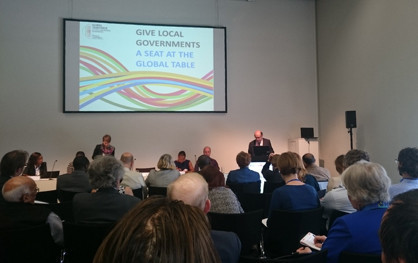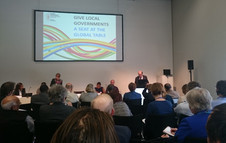
The German Habitat Forum took place in Berlin on the 1st and 2nd of June. The meeting was co-organized by the City (Senat) of Berlin, which is a very active member in Metropolis and UCLG, and by the ministry of economic development and cooperation, BMZ. The forum gathered more than 1000 participants to review the New Urban agenda.
UCLG participated in side meetings, and co organized the workshop “Cities as Actors” together with the city of Berlin and Metropolis.
The sustainability governance approach, developed by Metropolis was received as very inspiring and confirmed, once more the importance of integrated planning and management, as well as the consideration of cities as key for innovation, inclusion and integration, in other words, resilience.
“To reach balanced governance we need the city to strengthen participative local governance in alliance with civil society organizations and movements in line with the overall call for new partnership structures.”
Key messages like those of UCLG Secretary General Josep Roig “to reach balanced governance we need the city to strengthen participative local governance in alliance with civil society organizations and movements in line with the overall call for new partnership structures.” Rose Molokoana, from SDI (Slum Dwellers International), confirmed the strong interest of NGOs getting ahead and offering the experience “we are unprofessional professionals, but we can contribute to a better management, also we want to see evictions and settlement well addressed”.
The German government expressed its commitment and investment to implement the New Urban Agenda, both, in their partnership programs but also in investment of 700 milliards into urban development in German cities and towns. On behalf of German cities association DST, the president mayor Eva Lohse from Ludwigshafen expressed that each city has its own DNA; and that is essential for integrated urban development and quality of life depends on local partnerships. She stated also that globally a minimum of 20% of public expenses should be delivered to local governments and they should decide how to spend it. However, Ani Dasgupta from the World Resource Institute (WRI) reminded that highly populated cities in the South have very little resources to spend per capita.
The UCLG Metropolis key recommendation on the appreciation of local governments as “sphere of government” was fully taken up in the declaration that the Forum handed to Dr Clos during the closing ceremony.
- Empower cities as actors to achieve the 2030 Agenda and Paris Agreement
- Initiate transformative approaches for sustainable urban development
- Strengthen the enabling institutional, legal and financial frameworks of cities
- Create opportunities for engagement and initiate partnerships for implementation
- Focus the follow-up of the New Urban Agenda on policy dialogue and learning
- Give more voice to cities in the global urban governance
In addition to these points, participants pointed out that a main opportunity lies in cultural strategies to achieve an innovative urban agenda Creativity is a renewable resource, as stated by Charles Landry, urban expert, and a bridge between generations.
Finally, the forum counted on some wise personalities such as the former minister Toepfer, who set the Urban Agenda into the context of SDGs and the global agreement on climate change, the MILESTONES of United Nations in 2015: The objective of Habitat III cannot be an agenda for cities. We need to recognize cities as a cornerstone in a world of peace. We need to remind Willy Brand “there is no peace without development, there is no development without peace.”











